
Trust and Uncertainty: COVID-19 Vaccination
How we arrived at our research idea:
We were originally interested in the University’s communications and how students felt about the University’s actions during this pandemic, but that was a very broad concept. We looked into trust and uncertainty toward COVID-19 vaccines. Our research project started about the uncertainty of vaccines specifically, but as you will see later, the survey results transformed our research to focus more on the uncertainty of what life after being vaccinated looks like as well as how people feel about those who don’t share their own views.
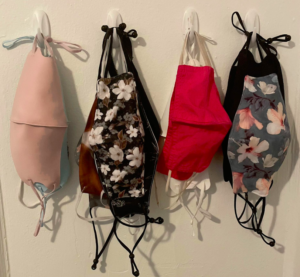
What we did:
We sent out a 24 question survey containing 5 different sections:
- Demographics,
- News and Communication,
- Views on Vaccines,
- Views on Vaccines cont.,
- Interviews
We then posted this survey on UChicago-Only Facebook groups, as well as sent to professors and TAs and various RSOs. We got 81 total responses, 8 of which said they would be willing to interview. As of now we have completed 2 interviews.
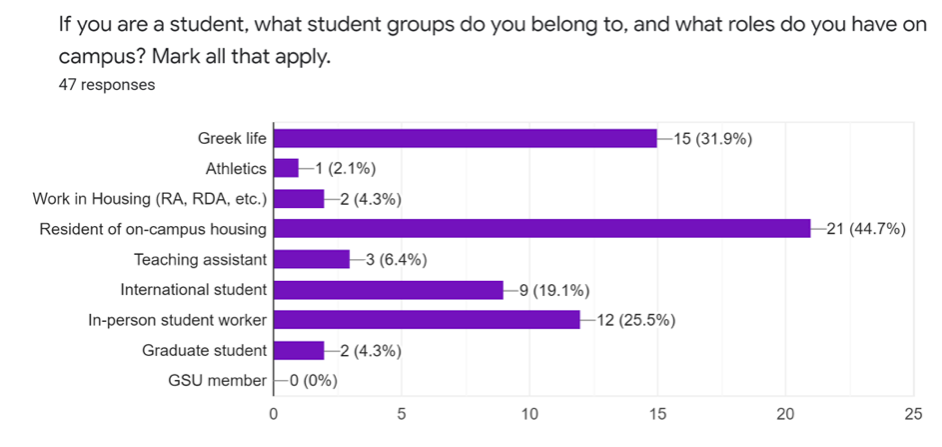
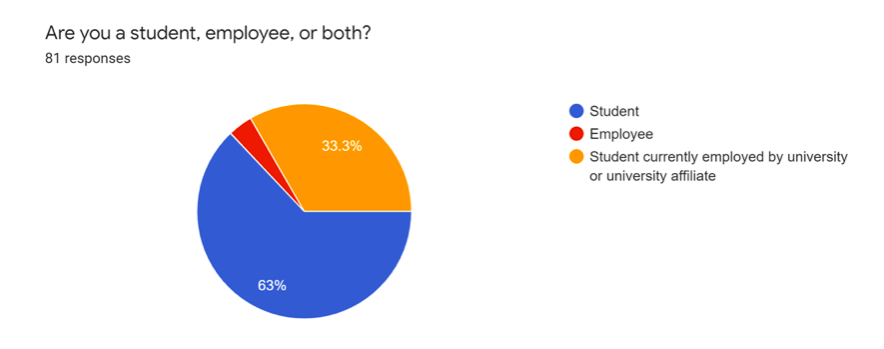
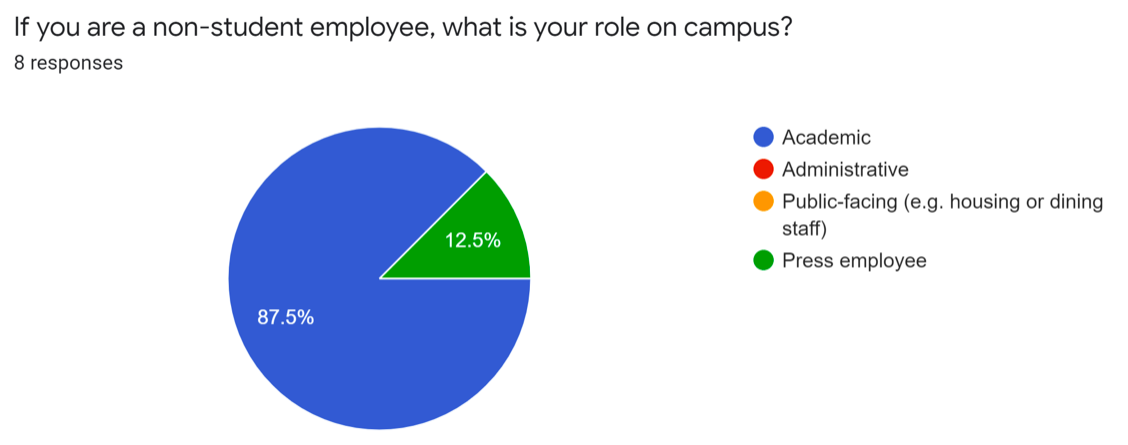
Life after vaccine & Ethical Concerns:
Our Speculations:
- People who have more members within their inner circle that are vaccinated might feel more comfortable with social gatherings / getting back to normal sooner
- Frequency of looking at news might make people feel less optimistic about “getting back to normal soon”
- A sense of urgency towards vaccinations might make people more comfortable with others misrepresenting their vaccine eligibility
- Lying about vaccine eligibility might be associated with eagerness to get back to normal – “Rushing the process”
This was the first time in which we got more significantly differing views which caused us to focus more on the uncertainty of what life after being vaccinated looks like rather than the uncertainty surrounding the actual vaccine.
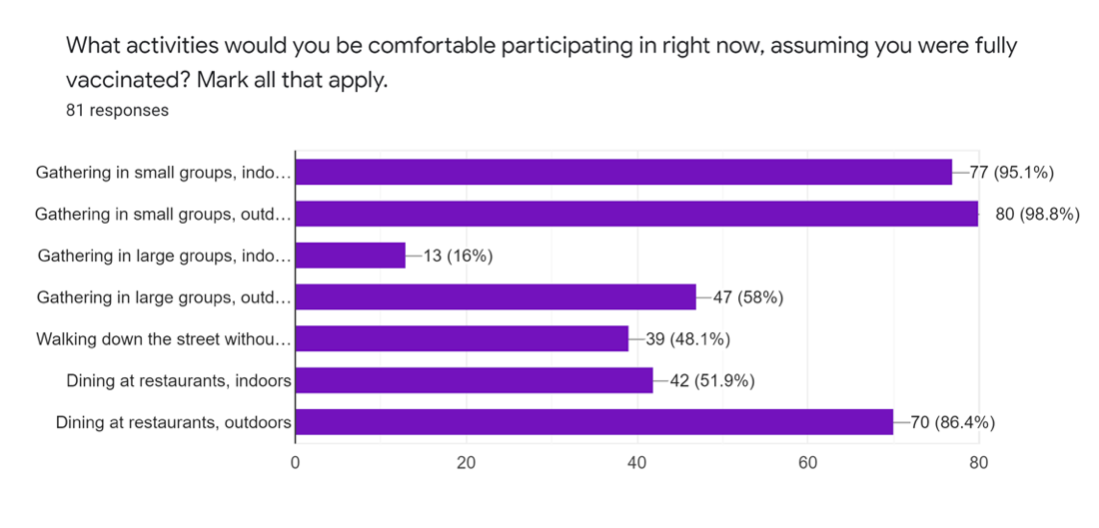
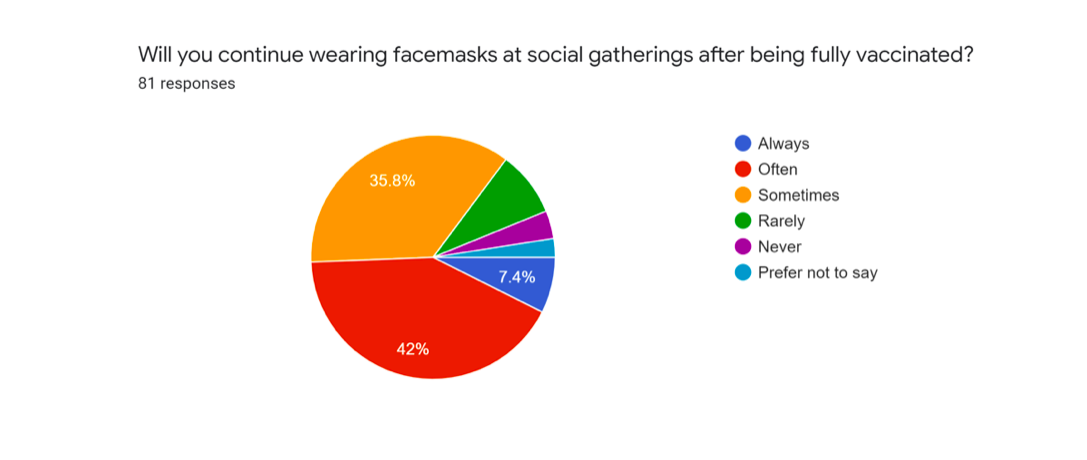
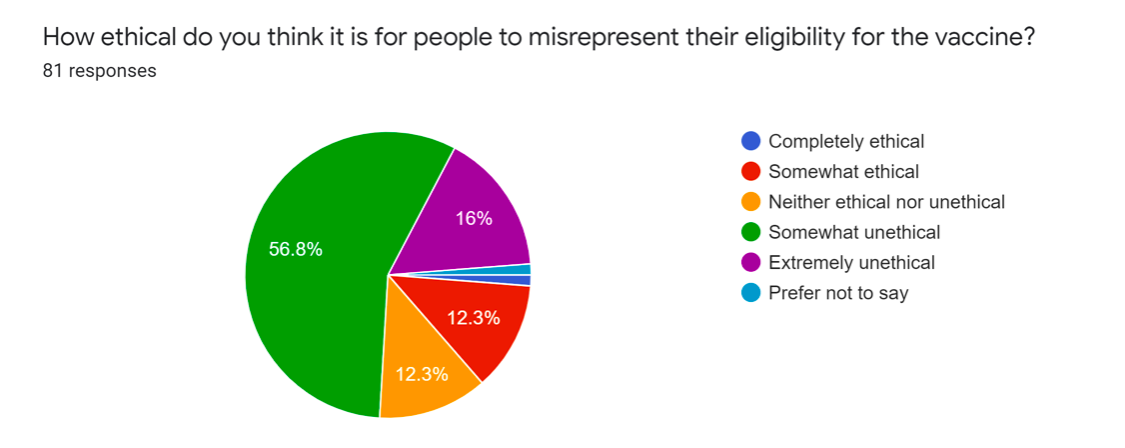
“So many people are just like refusing to do it and like putting other people at risk by doing so, […] sort of the way I see it, it’s like a social responsibility, you know, like breaking a social contract by like refusing and it’s just very frustrating”
–interviewee on those who refuse to get vaccinated
Checking the Speculations:
People who have more members within their inner circle that are vaccinated might feel more comfortable with social gatherings / getting back to normal sooner
We asked in our survey for people to check off what activities they would feel comfortable doing assuming they were fully vaccinated. Of those activities, we assigned a “risk factor” to each depending on how COVID-Safe they are (For example, walking down the street without a mask – 1, Gathering in large groups, indoors – 7). We then averaged the “risk factor” of those with certain percentages of their family and friends vaccinated. A higher risk factor indicates more willingness to “return to normal” (participate in what is currently considered unsafe because of COVID)
The question asked was “If you had to estimate, what proportion of your close friends and family have received at least one vaccine shot?”
- Those who responded 0% had a risk factor of 15.8
- Those who responded 10% had a risk factor of 16.3
- Those who responded 20% had a risk factor of 16.6
- Those who responded 30% had a risk factor of 14
- Those who responded 40% had a risk factor of 18.2
- Those who responded 50% had a risk factor of 16.6
- Those who responded 60% had a risk factor of 17.4
- Those who responded 70% had a risk factor of 16.6
- Those who responded 80% had a risk factor of 15.8
- Those who responded 90% had a risk factor of 16.3
- Those who responded 100% had a risk factor of 16.6
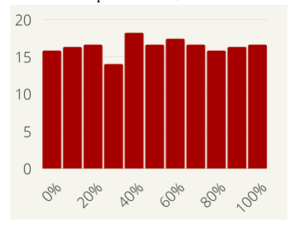
There was very little correlation between the proportion of vaccinated friends and family and people’s eagerness to return to normal
Frequency of looking at news might make people feel less optimistic about “getting back to normal soon”
-
- By following the same process as above (averaging out each group’s “risk factor”) we found a very slight correlation between those who read the news and those who are more eager to return to normal.
- The highest risk factor was those who read the news “Almost Never” at 21.5 and the lowest was those who read the news “Sometimes” at 15.1
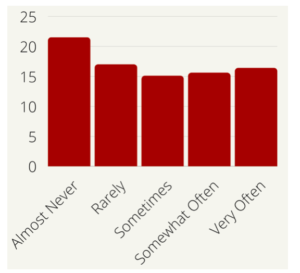
“[…] even with the vaccine, like we don’t know what the long term is”
–interviewee on how they see life after the pandemic
A sense of urgency towards vaccinations might make people more comfortable with others misrepresenting their vaccine eligibility
-
- Over more than half of respondents thought it was “Somewhat Unethical” to misrepresent oneself in order to get vaccinated
- People who thought it was “Very Urgent” for the general public to be vaccinated on average thought it was more ethical to misrepresent one’s eligibility than those who thought it was “Somewhat Urgent” or “Not Urgent” (These two were combined due to a very small number of responses who thought it was “Not Urgent”). However the difference was very small as those who said “Very Urgent” had an average 2.1 (on a scale of 1-5, with 1 being Extremely Unethical and 5 being Extremely Ethical) compared to those who said “Somewhat Urgent” or “Not Urgent” which had an average of 2 on the same scale.
- 14% of those who thought it was “Not Urgent” and “Somewhat Urgent” for the general public to be vaccinated thought it was “Extremely Unethical” to misrepresent one’s eligibility, while 16% of those who thought it was “Very Urgent” for the general public to get vaccinated thought it was “Extremely Unethical”
- Interestingly, 33% of those who thought it was “Not Urgent” for themselves to be vaccinated thought it was “Extremely Unethical” to misrepresent oneself, however, only 18% of those who thought it was “Very Urgent” for themselves to be vaccinated thought it was “Extremely Unethical” for one to misrepresent themselves.
“I think people are sometimes like so concerned about getting their own thing they don’t think about who they’re stepping on to get to it.”
-interviewee on those who misrepresent their vaccine eligibility
Lying about vaccine eligibility might be associated with eagerness to get back to normal – “Rushing the process”
-
- Those who voted “Extremely Unethical” had an average risk factor of 14.07
- Those who voted “Completely Ethical” and “Somewhat Ethical” (combined due to lack of voters who chose “Completely Ethical”) had an average risk factor of 14.73
- (The one voter who voted “Completely Ethical” had a risk factor of 14)
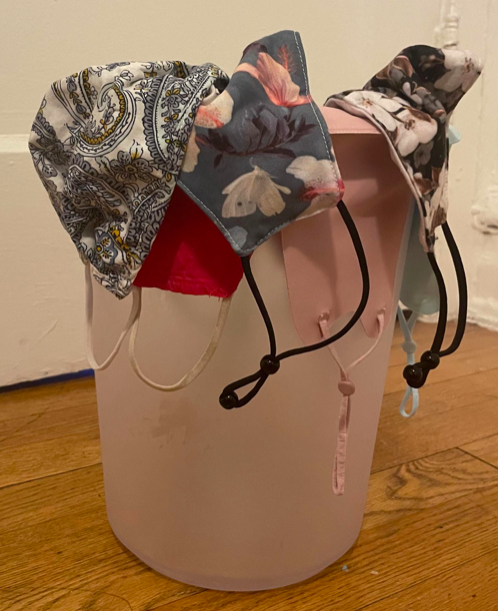
Other, Interesting Findings:
Of those who feel it is “Very Urgent” for the general public to be vaccinated:
54% think it is “Somewhat Unethical” to misrepresent oneself in order to get the vaccine.
77% think there are certain circumstances under which misrepresenting vaccine eligibility is ethical
73% of those who (on a scale of 1-7) don’t understand those who will not get vaccinated (a 1) trust the vaccine completely (7 on a scale of 1-7) .
77% of those who feel “Very Positive” towards the vaccine state that on aggregate, their immediate family also feel “Very Positive” towards it.
85% of people who read the news “Almost Never” and “Rarely” have a preference for vaccines
56% of people who read the news “Very Often” had no preference
25% of those whose families feel “Somewhat Negative” towards the vaccines selected 1 on the scale of how much they trust the vaccines (1 being the least, 5 the best), no one whose family feel “Somewhat Negative” voted higher than a 5 on the scale
22% of those whose families feel “Somewhat Positive” towards the vaccines selected a 7 on the scale, and none of them voted lower than a 5.
